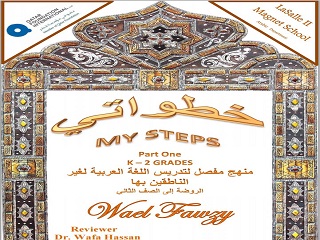Language of Presentation: Arabic, English
Media Format: Downloadable File
School Level: Elementary
Institution/Provider: LaSalle II Magnet School
Author: Wael Fawzy
Collection:
Condition of Use: Public Domain Description:
This Arabic lesson for kindergarteners, developed by Wael Fawzy at LaSalle II Magnet School in collaboration with Qatar Foundation International, includes five engaging units packed with interactive activities to introduce students to the Arabic language. The lesson begins with a fun image-based introduction that pairs each Arabic letter with a noun it begins with and an accompanying picture. Students are also provided with a list of these letters and words to bring home.
Unit One, Greetings, answers the question “Who speaks Arabic? Who are we in our Arabic classroom?” and teaches students culturally appropriate ways to say hello and goodbye, and introduce themselves. The unit also introduces students to the Arabic letters with tracing exercises. Unit Two, Using Arabic at School, teaches students courtesy expressions and classroom commands and then has them interact with each other using the learned vocabulary. The unit also introduces the rest of the alphabet, culturally appropriate ways to behave in the classroom, and concludes with songs for the students to perform. Unit Three, Fun with 1-20, as the title suggests introduces students to the Arabic numbers 1-20 through song and rhyme. Interactive number activities include making the numerals out of clay.
Unit Four, Colors and Fruits, teaches students the Arabic names for common fruits and colors and express whether they like or dislike them. Activities include gathering class data on fruit and color preferences, and the cultural relevance of fruit in the Arab world is also explored. Finally, Unit Five, My family, teaches students how to talk about their families and answer questions using the new vocabulary. Activities include labeling a family photo and presenting it to the class.
The unit aims to have students speak, read, and listen at the novice-low level, and focuses on cultural aspects of the Arabic language.
This curriculum was made possible through support and funding from Qatar Foundation International, LLC (QFI). A not-for-profit organization, QFI is a U.S.-based member of Qatar Foundation and is focused on grant-giving and programmatic activities that promote education as a force that facilitates collaboration across geographical, social and cultural boundaries. To learn more about QFI, please visit: www.qfi.org. >
Download Here

